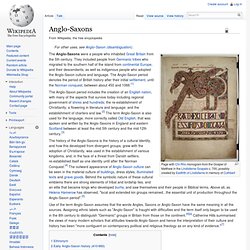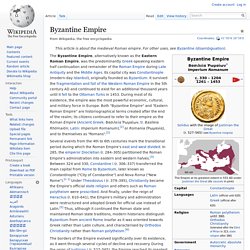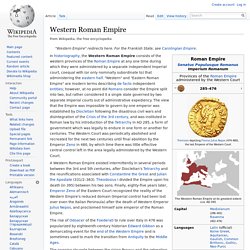

Anglo-Saxons. The Anglo-Saxons were a people who inhabited Great Britain from the 5th century.

They included people from Germanic tribes who migrated to the southern half of the island from continental Europe, and their descendants; as well as indigenous people who adopted the Anglo-Saxon culture and language. The Anglo-Saxon period denotes the period of British history after their initial settlement, until the Norman conquest, between about 450 and 1066.[1] The history of the Anglo-Saxons is the history of a cultural identity, and how this developed from divergent groups, grew with the adoption of Christianity, was used in the establishment of various kingdoms, and, in the face of a threat from Danish settlers, re-established itself as one identity until after the Norman Conquest.[4] The outward appearance of Anglo-Saxon culture can be seen in the material culture of buildings, dress styles, illuminated texts and grave goods.
Ethnonym. Roman Empire. Italia. Byzantine Empire. The Byzantine Empire, alternatively known as the Eastern Roman Empire, was the predominantly Greek-speaking eastern half continuation and remainder of the Roman Empire during Late Antiquity and the Middle Ages.

Its capital city was Constantinople (modern-day Istanbul), originally founded as Byzantium. It survived the fragmentation and fall of the Western Roman Empire in the 5th century AD and continued to exist for an additional thousand years until it fell to the Ottoman Turks in 1453. During most of its existence, the empire was the most powerful economic, cultural, and military force in Europe. Western Roman Empire. The rise of Odoacer of the Foederati to rule over Italy in 476 was popularized by eighteenth-century historian Edward Gibbon as a demarcating event for the end of the Western Empire and is sometimes used to mark the transition from Antiquity to the Middle Ages.

Background[edit] As the Roman Republic expanded, it reached a point where the central government in Rome could not effectively rule the distant provinces.